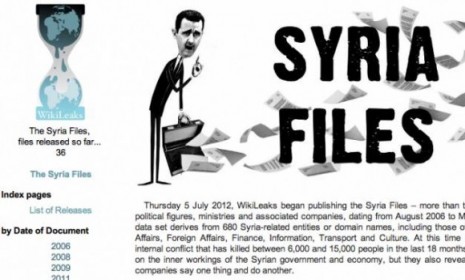WikiLeaks' Syria documents: 5 talking points
The controversial secret-sharing site is back in the news, vowing to embarrass both Syria's government and its opponents

A free daily email with the biggest news stories of the day – and the best features from TheWeek.com
You are now subscribed
Your newsletter sign-up was successful
On Thursday, secret-spilling clearinghouse WikiLeaks stepped into the increasingly bloody conflict in Syria, rolling out the first of more than 2.4 million emails from and to the government of Syrian President Bashar al-Assad. At a press conference in London, WikiLeaks spokeswoman Sarah Harrison said that the "Syria Files," covering the period between August 2006 and March 2012, will shine a light on the Assad regime and its Western collaborators, and that WikiLeaks is "statistically confident" the vast majority of files are genuine. She read a statement from WikiLeaks founder Julian Assange — holed up in London's Ecuadorian Embassy, where he's seeking asylum to avoid facing rape charges in Sweden — promising that "the material is embarrassing to Syria, but it is also embarrassing to Syria's opponents." Here are five things to know about WikiLeaks' newest document dump:
1. WikiLeaks is dribbling out the revelations
The cache of leaked files is not only massive — eight times larger than WikiLeaks' seminal "Cablegate" dump, the group says — but also in a smorgasbord of languages, including 400,000 in Arabic and 68,000 in Russian. So far, WikiLeaks has only released 25 emails on its site. The plan is to post the documents over a two-month period, in conjunction with "groundbreaking stories" from selected news organizations around the world, including Italy's L'Espresso, Germany's ARD, France's Owni, Spain's Publico.es, Egypt's Al Masry Al Youm, and Lebanon's Al Akhbar. The Associated Press was originally listed, too, but objected to being called a WikiLeaks "collaborator."
The Week
Escape your echo chamber. Get the facts behind the news, plus analysis from multiple perspectives.

Sign up for The Week's Free Newsletters
From our morning news briefing to a weekly Good News Newsletter, get the best of The Week delivered directly to your inbox.
From our morning news briefing to a weekly Good News Newsletter, get the best of The Week delivered directly to your inbox.
2. Western embargo-skirters should be nervous
The first batch of emails, reported in L'Espresso, concerns Selex Elsag, a subsidiary of Italian defense giant Finmeccanica. The correspondence apparently shows that Selex was selling Syria's police about $50 million worth of high-tech communications equipment as late as May 2011, when the European Union placed an embargo on sending such equipment to Syria, and training Syrian forces on how to, among other things, use the equipment in attack helicopters as late as February 2012, when the government crackdown was in full swing. Selex will have company soon enough, says David Kenner at Foreign Policy. All "Western companies looking to make a buck" in Syria by bending the rules over the past year should probably brace for some ugly PR.
3. Syrian fence-sitters should be terrified
"The most important category" of people who could be affected by WikiLeaks' document dump is "Syrians on the fence" in the conflict, says Kenner. The Assad regime is openly treating the conflict as a war, "and any instances of Syrian officials opening channels with rebels, or vice versa, could get someone killed." As we learned from the "Cablegate" dump, WikiLeaks has a "checkered" record of protecting sources and vulnerable bystanders mentioned in its leaked documents. "The stakes are even higher in Syria — here's hoping WikiLeaks does the right thing and protects those mentioned in these emails."
A free daily email with the biggest news stories of the day – and the best features from TheWeek.com
4. The Syria files probably won't hurt Assad's regime
This isn't the first leak of Assad regime emails, says John Glaser at AntiWar.com, and the last batch, harvested by hacktivist collective Anonymous and published in March in Britain's The Guardian, fell kind of flat: They detailed conversations between Assad, his wife, and close associates, but "did not reveal much beyond the fact that Syria's rulers seem far removed from the actual conflict." The Assad regime probably shouldn't "be particularly worried by this release," either, says Kenner. Sure, the emails could embarrass an official or two, but "you don't need millions of leaked emails" to know that Assad will do whatever's necessary to stay in power — "you just need to read the news."
5. This data dump suggests a new direction for WikiLeaks
What's most "striking" about WikiLeaks' newest project is its "broader, more neutral approach" to leaking, says Jim Maceda at NBC News. The Syria Files purport to go after both Syrian officials and anyone who communicated with them, eschewing "the trenchant ideology or politics associated with previous data sets." Is WikiLeaks going "mainstream"? Spokeswoman Harrison says no, and that she is not "aware of any 'rebranding' by the world's most controversial spiller of international secrets." But considering the financial and legal woes the site faces, stay tuned.
Sources: AFP, AntiWar, Christian Science Monitor, Foreign Policy, NBC News, New York Times, PC World, Reuters, Telegraph, Washington Examiner
-
 Is Andrew’s arrest the end for the monarchy?
Is Andrew’s arrest the end for the monarchy?Today's Big Question The King has distanced the Royal Family from his disgraced brother but a ‘fit of revolutionary disgust’ could still wipe them out
-
 Quiz of The Week: 14 – 20 February
Quiz of The Week: 14 – 20 FebruaryQuiz Have you been paying attention to The Week’s news?
-
 The Week Unwrapped: Do the Freemasons have too much sway in the police force?
The Week Unwrapped: Do the Freemasons have too much sway in the police force?Podcast Plus, what does the growing popularity of prediction markets mean for the future? And why are UK film and TV workers struggling?